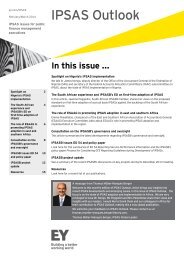You also want an ePaper? Increase the reach of your titles
YUMPU automatically turns print PDFs into web optimized ePapers that Google loves.
4 Political reformFrom the early days of independence in the 1960s right through the 1980s, almost every African country wasruled by some form of dictator. However, the democratic elections in Namibia in 1989 symbolized a turning pointin Africa’s political development. Within months after the Berlin Wall had fallen, Nelson Mandela had been releasedfrom jail, and an era of political reform and democratization had begun.Looking back on 25 years of slow but steady progress, Africa’s political landscape has changed dramatically. Someform of regular democratic elections has increasingly become the norm across most parts of Africa. Althoughthe process is often not perfect, and there is still a long way to go in many countries, progress is very real andsubstantial. To illustrate the point, between 1960 and the fall of the Berlin Wall in 1989, only five African countriesheld elections on any kind of regular basis, and there was only a single instance - in Mauritius - of a peaceful,democratic transfer of power. In contrast, since 1990, we have seen over 35 ruling parties or leaders changingthrough a democratic process - Kenya’s presidential elections last year being the most high profile recent example.Democracy has become entrenchedAfrica is rapidly democratizing, with major progress noted since the 1990’s10.000Latin America and the Caribbean8.0006.0004.000Emerging and developing Asia2.000Africa0-2.000-4.000-6-6.000-8.0001960 1965 1970 1975 1980 1985 1990 1995 2000 2005 2010+2Source: Polity IVAfrica 2030: Realizing the possibilities13





